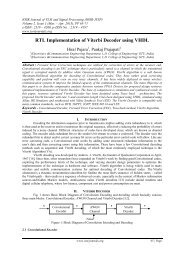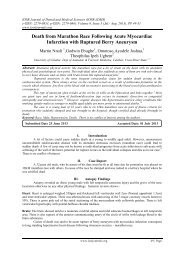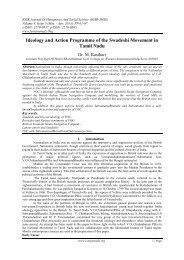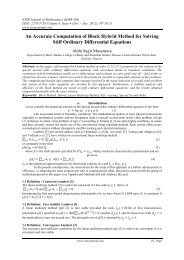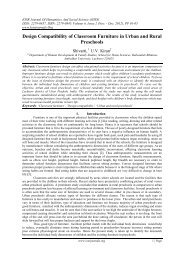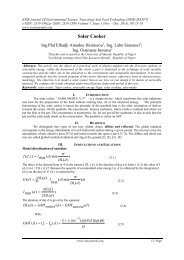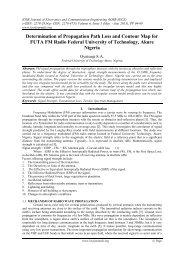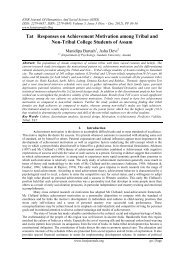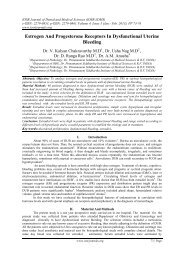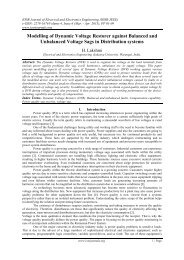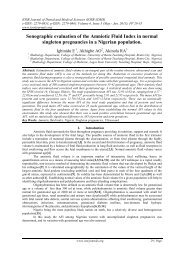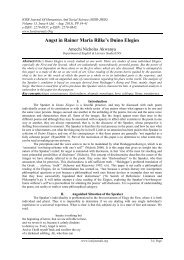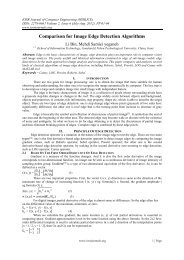Initial Conquest of India by Turks and Their Slaves - IOSR
Initial Conquest of India by Turks and Their Slaves - IOSR
Initial Conquest of India by Turks and Their Slaves - IOSR
Create successful ePaper yourself
Turn your PDF publications into a flip-book with our unique Google optimized e-Paper software.
<strong>IOSR</strong> Journal Of Humanities And Social Science (JHSS)<br />
ISSN: 2279-0837, ISBN: 2279-0845. Volume 5, Issue 4(Nov. - Dec. 2012), PP 23-33<br />
Www.Iosrjournals.Org<br />
Internal Conflicts <strong>and</strong> African Development: The Nigerian<br />
Experience<br />
Nwanegbo, Chukwuemeka Jaja<br />
Department <strong>of</strong> Political Science Anambra State University, Igbariam Campus<br />
Abstract: The work was guided <strong>by</strong> the interest to find out what the causes <strong>of</strong> internal conflicts in Africa are, the<br />
impacts <strong>and</strong> the general affect on the under-development nature <strong>of</strong> Africa in general <strong>and</strong> Nigeria in particular.<br />
To get these objectives achieved, some leading questions were asked to help enquiring into these areas. First, it<br />
tries to find out if high incidence <strong>of</strong> poverty accounts for the persistence <strong>of</strong> internal conflicts in Nigeria <strong>and</strong><br />
secondly, to know whether the low level <strong>of</strong> development in Africa today is a consequence <strong>of</strong> persisting internal<br />
conflicts. Guided <strong>by</strong> the relative deprivation theory, the paper came up with the findings that internal conflict<br />
<strong>and</strong> undemocratisation stalls the Nigerian development <strong>and</strong> indeed African development. Based on these, the<br />
paper made the suggestions in the form <strong>of</strong> conflict resolution strategy that could put the African countries out <strong>of</strong><br />
contentions <strong>and</strong> conflicts <strong>and</strong> in the part <strong>of</strong> development.<br />
Key words: Conflict, Internal Conflicts <strong>and</strong> Development.<br />
I. Introduction<br />
Literature on conflict all over the world <strong>and</strong> Africa specifically is littered with the notion <strong>of</strong> the<br />
predominance <strong>of</strong> internal or inter-group conflict over international conflicts (Vogt <strong>and</strong> Aminu, 1996; Okafor,<br />
1997; Okwueze, 1997; Riley, 1998; Elaigwu, 2005; Nwanegbo, 2005b, 2006, 2008). Hardly would one read<br />
the dailies or listen to the radio, both local <strong>and</strong> foreign or the television without getting the news <strong>of</strong> domestic<br />
problems. It is obtainable worldwide but assumes chronic level in the Africa Countries. Indeed, Riley (1998)<br />
noted that most African conflicts were intra-statal rather than interstatal, although they do have a much broader<br />
impact <strong>by</strong> fuelling regional parallel economics in light arms <strong>and</strong> assets, generating displaced refugee<br />
populations, <strong>and</strong> creating exiled communities. Most African conflicts are thus becoming highly internationalized<br />
both in their effects <strong>and</strong> in the efforts <strong>of</strong> various parties to prevent, manage or resolve them.<br />
It follows that the consequences <strong>of</strong> internal conflict are much <strong>and</strong> not only on the warring states alone<br />
but also to the other countries either bordering with them, existing within the same regional line or having<br />
interest <strong>of</strong> the conflicting nations. It hinders the countries politically, economically <strong>and</strong> also on social stability<br />
<strong>and</strong> consequently, all <strong>of</strong> them leads to problems <strong>of</strong> development in Africa.<br />
Development in this context goes beyond individual country’s development. It has to do with African<br />
development. Conflict creates refugee problem to other countries, it sets neighbouring <strong>and</strong> interested countries<br />
apart, <strong>and</strong> it distracts <strong>and</strong> distorts the principles on which regional developmental organizations are based. For<br />
instance, Economic Commission for West African States (ECOWAS) virtually left its traditional economic<br />
interest <strong>and</strong> objectives <strong>and</strong> went into very expensive peacekeeping operation. It breeds crimes <strong>and</strong> other social<br />
ills in the warring country <strong>and</strong> accommodating neighboring countries.<br />
One highly supported argument in the African underdevelopment is the unequal relationship existing<br />
between African countries <strong>and</strong> the western capitalist countries. This was both on unequal exchange <strong>and</strong> or terms<br />
<strong>of</strong> relationship <strong>and</strong> international division <strong>of</strong> labour. These lead to the establishment <strong>of</strong> the continental/regional<br />
organizations like the Organization <strong>of</strong> African Unity (OAU), Economic Commission <strong>of</strong> West African States<br />
(ECOWAS) in Africa, simply to enhance unity, cooperation <strong>and</strong> co-ordination <strong>of</strong> resources to pull through the<br />
excruciating relationship <strong>of</strong> the countries <strong>and</strong> continent with the western capitalism. Some other organizations<br />
also were established <strong>by</strong> other International Organizations to enhance third world development (at least on the<br />
economic side) like United Nations Development Programme (UNDP), Food <strong>and</strong> Agricultural Organization<br />
(FAO), World Bank etc. Still, they could not, for as long as they have existed, engendered development in<br />
Africa or even economic progress. Record <strong>of</strong> underdevelopment for all these long, keeps rising. But noticeably,<br />
rising with it is the records <strong>of</strong> internal conflict in most countries in Africa. Even those countries not known<br />
before for destructive conflict now top the list. This calls for investigation. Hence, this work seeks to investigate<br />
the place <strong>of</strong> internal conflict <strong>and</strong> its effect on African underdevelopment conditions (raise pertinent questions)<br />
<strong>and</strong> accordingly explore the ways <strong>of</strong> mitigating the incidence <strong>of</strong> conflict <strong>and</strong> hence achieve the much-needed<br />
development in Africa.<br />
In the cause <strong>of</strong> this study, we limited our empirical study to Nigerian experience. The reason for<br />
selecting Nigeria is because Nigeria presents a good example <strong>of</strong> an average African country with numerous<br />
ethnic groups, religious groups, interest groups <strong>and</strong> other forms <strong>of</strong> groupings <strong>and</strong> also has experienced<br />
www.iosrjournals.org<br />
23 | Page



